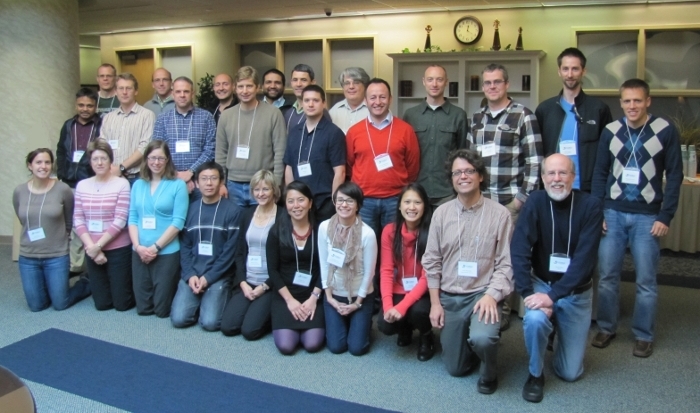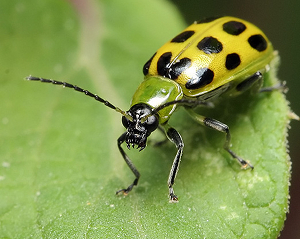| Description | Participants | Agenda | Summary | Products |
|---|
NIMBioS Investigative Workshop
Insect Pest Resistance Evolution

Topic: The evolution of pest resistance to crop protection strategies: What we know, the models we have, and the models we need
Meeting dates: November 14-15, 2013
Location: NIMBioS at the University of Tennessee, Knoxville
Organizers:
Nicholas A. Friedenberg, Applied Biomathematics, Inc., Setauket, NY
David Crowder, Dept. of Entomology, Washington State Univ., Pullman
Insect Pest Resistance Evolution WordPress site
Objectives: Crop protection strategies help stabilize food supplies and economies worldwide. Pest resistance to protectants and cultural practices represents a serious risk in terms of both economics and the public good. Mathematical models have come to play a central role in insect resistance management (IRM) and now inform the development, stewardship, and regulation of crop protectants. Such models confront a vast array of factors representing the major challenges facing ecological and evolutionary theory in general, including genetics, behavior, population dynamics, and spatial processes. Agricultural systems are highly manipulated landscapes and their theoretical idealization can be used to explore the consequences of managed spatial and temporal heterogeneity. This investigative workshop will bring together scientists with diverse backgrounds, including empirical entomologists, applied and basic modelers, geneticists, and government agency scientists familiar with regulatory goals. The workshop will address two overarching goals. First, it will focus on developing a modeling framework that can provide guidance on the absolute time required for resistance to evolve in given systems. Second, it will aid in designing sustainable crop protection strategies through the investigation of resistance evolution across landscapes. The workshop will synthesize the state of knowledge about resistance evolution, define focused research goals for both the theoretical and empirical community, foster greater connection between theory and application, and broaden the role of agricultural entomology in elucidating general phenomena in applied evolution.
Descriptive Flyer: PDF
 Summary Report. The NIMBioS Investigative Workshop on pesticide resistance evolution explored links between pest population dynamics, behavior, and evolution and agricultural practices for the purpose of increasing our ability to forecast the time and location at which pest control measures will fail due to resistance. Workshop presentations and discussions focused on biological complexity currently missing from models of pest resistance, such as dynamic host preference, selection for resistance by agents in the natural environment, specific mechanisms for resistance, and the evolutionary origins of pest variants within native species. Participants also discussed statistical and risk-analytical methods necessary for using resistance evolution models to inform real-world decisions under uncertainty. We are developing working group proposals to build on areas of strength among participants. These include the evolutionary origins of pests, integrating multi-scale movement behavior into resistance models, and using models to harmonize integrated pest management with resistance management.
Summary Report. The NIMBioS Investigative Workshop on pesticide resistance evolution explored links between pest population dynamics, behavior, and evolution and agricultural practices for the purpose of increasing our ability to forecast the time and location at which pest control measures will fail due to resistance. Workshop presentations and discussions focused on biological complexity currently missing from models of pest resistance, such as dynamic host preference, selection for resistance by agents in the natural environment, specific mechanisms for resistance, and the evolutionary origins of pest variants within native species. Participants also discussed statistical and risk-analytical methods necessary for using resistance evolution models to inform real-world decisions under uncertainty. We are developing working group proposals to build on areas of strength among participants. These include the evolutionary origins of pests, integrating multi-scale movement behavior into resistance models, and using models to harmonize integrated pest management with resistance management.
Products
Publications
Friedenberg NA, Shoemaker K, Root B. 2014. RAMAS IRM Version 2.0: Software for risk-based durability assessment.
Presentation
Friedenberg NA. February 2015. Corn Academic Summit. Monsanto Company, St. Louis, Missouri.
NIMBioS Investigative Workshops focus on broad topics or a set of related topics, summarizing/synthesizing the state of the art and identifying future directions. Workshops have up to 35 participants. Organizers and key invited researchers make up half the participants; the remaining participants are filled through open application from the scientific community. Open applicants selected to attend are notified by NIMBioS within two weeks of the application deadline. Investigative Workshops have the potential for leading to one or more future Working Groups. Individuals with a strong interest in the topic, including post-docs and graduate students, are encouraged to apply. If needed, NIMBioS can provide support (travel, meals, lodging) for Workshop attendees, whether from a non-profit or for-profit organization.
A goal of NIMBioS is to enhance the cadre of researchers capable of interdisciplinary efforts across mathematics and biology. As part of this goal, NIMBioS is committed to promoting diversity in all its activities. Diversity is considered in all its aspects, social and scientific, including gender, ethnicity, scientific field, career stage, geography and type of home institution. Questions regarding diversity issues should be directed to diversity@nimbios.org. You can read more about our Diversity Plan on our NIMBioS Policies web page. The NIMBioS building is fully handicapped accessible.
NIMBioS
1122 Volunteer Blvd., Suite 106
University of Tennessee
Knoxville,
TN 37996-3410
PH: (865) 974-9334
FAX: (865) 974-9461
Contact NIMBioS


